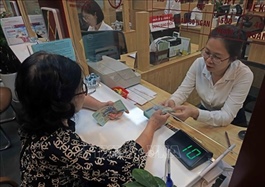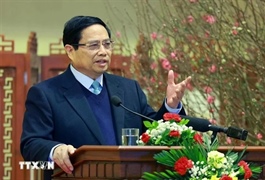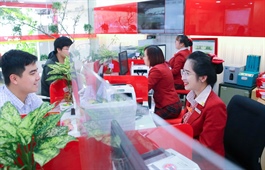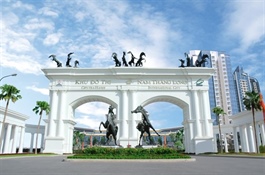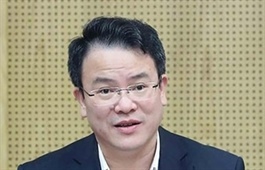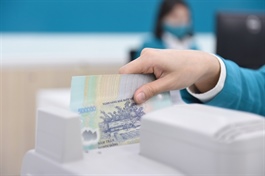Green finance to be unlocked
Green finance to be unlocked
As Vietnam progresses towards sustainability, integrating green finance is key to balancing economic growth with environmental preservation. The country’s unique social, political, economic, and environmental context presents both pros and cons for leveraging green finance solutions that align with global best practices while addressing local realities.
Vietnam has undergone substantial socioeconomic transformation in recent decades. However, rapid industrialisation and urbanisation have resulted in significant environmental impacts, including rising greenhouse gas emissions, deforestation, and urban pollution.

Anderson Tan, Managing director Marcellus Capital Group Asia Pte. Ltd. |
The government’s commitment to achieving net-zero emissions by 2050 highlights Vietnam’s focus on sustainability. Achieving this target requires unlocking substantial green investments. Green finance, which includes mechanisms such as green bonds, concessional loans, sustainability-linked loans, and carbon markets, provides financial support for projects that offer environmental benefits.
For Vietnam, aligning these instruments with domestic priorities, such as social equity, rural development, and energy transition, remains a challenge. To achieve its ambitious sustainability goals, Vietnam can adopt several cutting-edge green finance solutions that address both global trends and local needs.
Green and sustainability-linked bonds: Vietnam has made progress in green bond issuance, such as the State Bank of Vietnam’s encouragement for banks to issue green bonds.
Blended finance models: The strategic use of public or philanthropic capital to reduce risks for private investments- is well-suited for Vietnam. The Global Climate Partnership Fund has successfully partnered with Vietnamese banks to fund energy-efficient projects.
Structured funding: Another innovative sustainable financing is structured funding through private bond placements by Marcellus Capital Group, a United Kingdom-based global capital and growth advisory firm. This solution provides non-recourse project financing for companies embarking on large-scale schemes focused on the United Nations’ Sustainable Development Goals.
Carbon pricing mechanisms: Vietnam is exploring a domestic carbon market as part of its commitment to reducing emissions. The implementation of a pilot carbon market in 2025 is a key step, drawing lessons from China’s emissions trading system.
Sustainability-linked loans: These are loans where interest rates are tied to the borrower’s achievement of predefined sustainability performance targets. For example, in 2022, VPBank introduced sustainability-linked loans aimed at businesses adopting environmental, social, and governance (ESG) standards.
Despite these innovative solutions, several structural and operational challenges hinder Vietnamese businesses from fully accessing green finance. While ESG frameworks are increasingly recognised, many Vietnamese companies lack the expertise and resources to implement these standards comprehensively.
Another challenge is the fragmented information ecosystem. Accessing green finance requires familiarity with diverse funding mechanisms, eligibility criteria, and application processes. However, the absence of a centralised platform consolidating this information creates a barrier for businesses. Next, although Vietnam has introduced policies to encourage green finance, inconsistencies in enforcement and high compliance costs deter participation. Renewable energy firms often cite the high costs of environmental impact assessments as a deterrent to project implementation.
Overcoming Vietnam’s unique challenges requires a customised approach that integrates policy innovation, education, and tech. Educating businesses on ESG principles and green finance mechanisms is essential. The International Finance Corporation has partnered with Vietnamese banks to train smaller businesses on sustainability-linked financing. Expanding such initiatives can enhance ESG adoption.
Vietnam can leverage public-private partnerships to co-develop sustainable infrastructure projects, drawing from Malaysia’s success. For instance, they could finance large-scale renewable energy installations in provinces like Binh Thuan and Ninh Thuan, with government guarantees reducing investor risk.
Vietnam can, meanwhile, draw valuable lessons from its Asian neighbours. Singapore’s green finance action plan offers a model for creating a supportive ecosystem for sustainable investments. The Monetary Authority of Singapore has launched a $2 billion green investments programme to attract green asset managers. Vietnam could adopt a similar approach to build its green finance expertise.
The Philippines has mobilised capital through green bonds for disaster-resilient infrastructure. For instance, the country’s issuance of green bonds for flood mitigation projects offers a blueprint for Vietnam, which faces similar climate risks in the Mekong Delta region.
Indonesia’s success with blended finance for renewable energy projects underscores the importance of leveraging international partnerships. The country’s geothermal projects, funded through a mix of public and private capital, highlight pathways for Vietnam to finance its solar and wind capacities.
| Banking on banks to finance the green transition Companies must embrace green finance initiatives Budding potential in green finance and AI |







